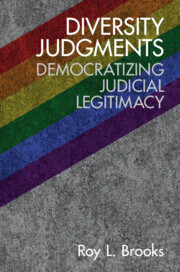Book contents
- Diversity Judgments
- Diversity Judgments
- Copyright page
- Dedication
- Contents
- Preface
- Acknowledgments
- Introduction
- Part I Asian Americans
- Part II African Americans
- Part III Women
- Part IV Latinx
- Part V Native Americans
- Part VI LGBTQ
- 14 Obergefell v. Hodges (Same-Sex Marriages)
- 15 Bostock v. Clayton County (Employment Discrimination)
- Part VII Intersectionality
- Part VIII Outsiders v. Outsiders
- Part IX White Males
- Part X Situational Outsiders
- Index
15 - Bostock v. Clayton County (Employment Discrimination)
from Part VI - LGBTQ
Published online by Cambridge University Press: 10 March 2022
- Diversity Judgments
- Diversity Judgments
- Copyright page
- Dedication
- Contents
- Preface
- Acknowledgments
- Introduction
- Part I Asian Americans
- Part II African Americans
- Part III Women
- Part IV Latinx
- Part V Native Americans
- Part VI LGBTQ
- 14 Obergefell v. Hodges (Same-Sex Marriages)
- 15 Bostock v. Clayton County (Employment Discrimination)
- Part VII Intersectionality
- Part VIII Outsiders v. Outsiders
- Part IX White Males
- Part X Situational Outsiders
- Index
Summary
Title VII of the Civil Rights Act of 1964 prohibits employers with fifteen or more employees from discriminating on the basis of “race, color, religion, sex, or national origin.” This prohibition encompasses all decisions related to hiring, firing, promotion, or any other action that otherwise affects the “terms, conditions, or privileges of employment.” The prohibition against sex discrimination was added to the bill as a floor amendment, some say as a political ploy to defeat the bill, which left it devoid of legislative history. Following the enactment of Title VII, the first chair of the Equal Employment Opportunity Commission (EEOC), Franklin Roosevelt, Jr., son of the former president, cited the suspect motivations for including the sex amendment as a basis for interpreting the ban on sex discrimination more loosely than the ban on racial discrimination. In the courts, however, the “because of sex” provision was strictly and plainly interpreted. It is “unlawful to discriminate against women because they are women and against men because they are men.”
- Type
- Chapter
- Information
- Diversity JudgmentsDemocratizing Judicial Legitimacy, pp. 345 - 376Publisher: Cambridge University PressPrint publication year: 2022

